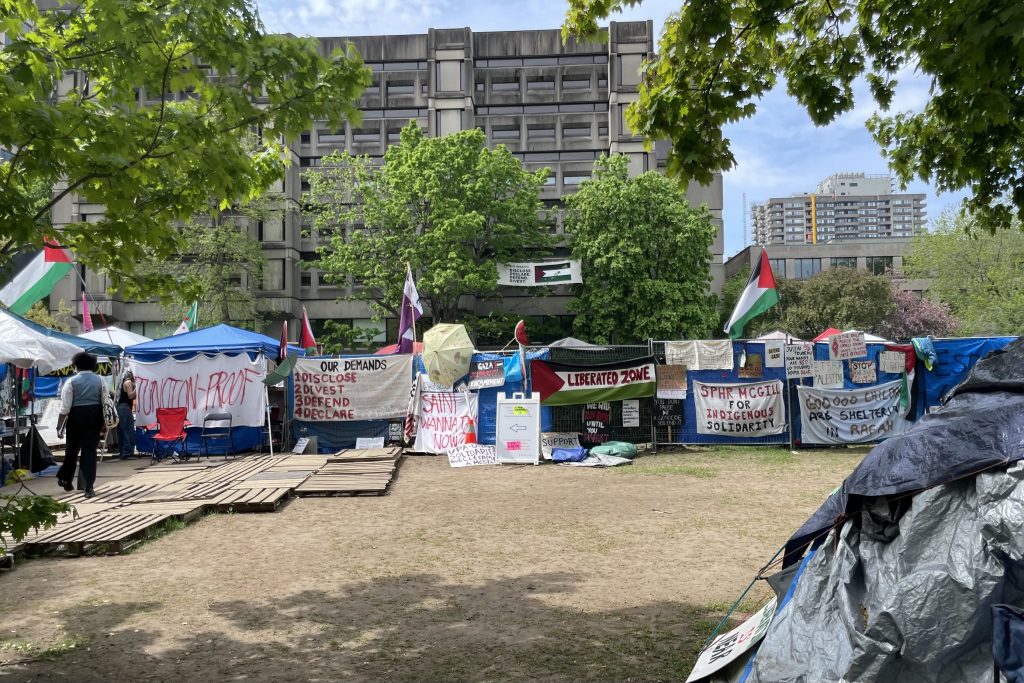Bill 21 has discriminatory consequences, warn activists ahead of Quebec City mosque attack anniversary
Posted January 28, 2023 3:05 pm.
Last Updated January 28, 2023 6:55 pm.
It’s been six years since the Quebec City mosque attack, and many in the community still feel targeted because of their religion.
Some critics are pointing to legislation like Quebec’s Bill 21 as being part of the problem in fostering divisiveness.
The province’s secularism law bans the wearing of religious symbols such as hijabs, kippas and turbans by teachers, judges, police and other government employees deemed to be in positions of authority.
“The idea that there’s state sanction behind a bill that has discriminatory consequences, I think is something that gives essentially a green light to other people with those same types of views,” said Idil Issa, the founder of Femmes Musulmanes Contre le Racisme.
A ruling from Quebec’s Court Appeal is pending on Bill 21, with many waiting to see if the Quebec government can use the notwithstanding clause.
MORE ON BILL 21:
- Pre-emptively using notwithstanding clause ‘not the right thing to do:’ Trudeau
- Quebec religious symbols ban violates equality right that can’t be overridden: lawyer
- Quebec’s highest court to begin hearing appeals on provincial secularism law
- ‘Political narrative’: Legault criticized for saying Quebec can’t welcome more immigrants
The notwithstanding clause, which is Section 33 of the Canadian Charter of Rights and Freedoms, allows Parliament or provincial legislatures to override certain sections of the charter and invoking it ahead of time prevents courts from weighing in.
“Our Constitution and our charter was devised and ratified to protect the rights of Canadians, to make sure that the government didn’t overstep those bounds,” said Issa, who is studying law at McGill University. “And so the notwithstanding clause can actually be used to kind of disregard those rights.”
François Legault’s CAQ government had pre-emptively invoked the notwithstanding clause on Bill 21.
If the province can in fact use the notwithstanding clause, critics are wondering how minority rights can be protected from future similar laws.
“When you transform people into second-class citizens using the weight of the state and the rule of law… then what you’re telling people is it is OK to treat them as lesser. And that is exactly what is happening,” said Stephen Brown, the CEO of the National Council of Canadian Muslims (NCCM).
“How do we call ourselves a country where we have the rule of law if the government can (do that)?”’
#WATCH: “Enormous problem,” says Stephen Brown, part of @nccm about the Quebec Government being able to use the notwithstanding clause to push laws which impact the rights of minorities.
FOR MORE NEWS: https://t.co/Mkgse1PTsL pic.twitter.com/6KkvGpqBLC
— CityNews Montreal (@CityNewsMTL) January 28, 2023
#WATCH: “A green light,” says Idil Issa a current Law student and founder of Femmes Musulmanes Contre Racisme about Bill 21 attributing to the rise of Islamophobia within Quebec.
For more news : https://t.co/Mkgse1PTsL pic.twitter.com/It69y36wrb
— CityNews Montreal (@CityNewsMTL) January 28, 2023
Brown says Legault justified Bill 21 by saying it would protect Quebec culture, seemingly insinuating certain minorities were not represented in that culture.
“It’s a massive dereliction of political leadership,” said Brown. “It’s blatantly saying ‘I am not the premier of all Quebecers. I’m the premier of those who think like me and who look like me and who speak like me.’
“So there’s one group in society that gets to wake up in the morning and decide how they want to live their lives. And there’s another group of society or other people in society, people like me, that have to wake up in the morning and say, ‘I wonder how my neighbours would want me to live.’
READ MORE: Muslim Awareness Week: launch of events to counter Islamophobia in Quebec
“This is the message that he’s sending people when he’s looking into the camera and telling people that ‘I, as the head of the government, can tell you how to live because of your identity.’ It’s a massive problem.”
A study on the impact of Bill 21 found there was an overall decline in a sense of acceptance as full-fledged members of Quebec society among the Jewish, Sikh, and Muslim communities. It was particularly high among Muslim women – at 80 per cent.
The study was conducted by the Association for Canadian Studies.
“In a society, you always want to have a balance of power,” said Issa. “You want to make sure that the population is protected against the government and that individual rights are respected and maintained.”
“All of us are a minority in one way or another,” added Brown. “And so what we need are firm commitments, structural solutions to making sure that the notwithstanding clause can no longer be used to take minority rights away because it’s popular.”
WATCH: Fighting the constitutionality of Quebec’s Bill 21
Recently, Prime Minister Justin Trudeau said he had the intention of contesting the pre-emptive use of the notwithstanding clause. That means if a provincial government wanted to use it, they would have to pass it through the courts to render a decision on if the law would be constitutional.
It’s something Brown says will only delay the effects of the notwithstanding clause.
“The fact that they would have to wait another six or seven months for a decision to be rendered at the Superior Court doesn’t really change the fact that minorities don’t really have rights that are protected by the charter,” he said. “They have permissions.”
—With files from The Canadian Press



